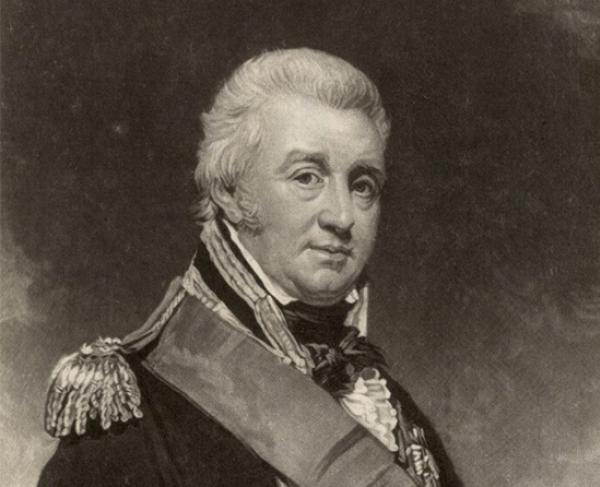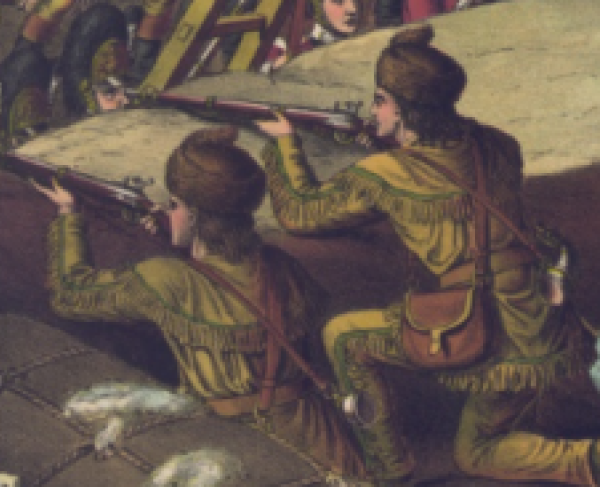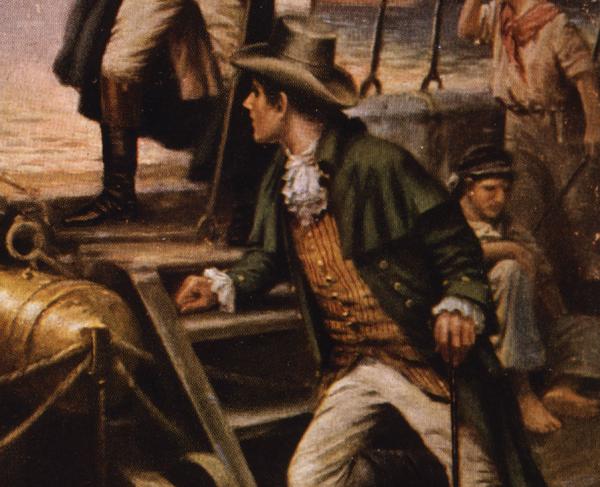Alexander Cochrane

Alexander Inglis Cochrane was a British naval officer and member of Parliament whose military career spanned roughly half a century. He served during the American Revolutionary War, the Napoleonic Wars and the War of 1812.
Cochrane was born in Scotland on April 23, 1758, to Jane Stuart and Thomas Cochrane. His father was a Scottish nobleman and army officer who rose to the rank of major. In the year Alexander was born, the elder Cochrane became the Eighth Earl of Dundonald, but Alexander—the sixth of eight sons—would not inherit his father’s title or property. Instead, he entered the Royal Navy “at an early age.”
By the age of 20, Cochrane had risen to the rank of lieutenant and saw service during the American Revolution. He served as signal officer to Admiral Sir George Rodney and was wounded during the April 17, 1780, Battle of Martinique. Soon thereafter, he promoted to captain and received command of the St. Lucia, the first of many vessels Cochrane commanded during his long career. During the conflict with revolutionary France, Cochrane developed a reputation as a skilled hunter of French privateers prowling through American waters.
Cochrane’s star rose dramatically during the Napoleonic Wars. In 1799, as recognition for his earlier service, Cochrane was brought back to Europe and given command of a 74-gun Ship of the Line, HMS Ajax. Under Cochrane’s command, Ajax took an active part in the 1801 campaign against Napoleon in Egypt and was instrumental in the amphibious landing at Alexandria. Cochrane’s “skill and enterprise” during that operation “stamped him as one of [Britain’s] ablest naval commanders.” Following the fall of that city, Ajax was among the first ships to enter the harbor. During the brief cessation of hostilities after Alexandria, Cochrane returned home and served as member of Parliament. When fighting with Napoleon resumed in 1803, Cochrane received command of the HMS Northumberland and, in 1804, a promotion to rear-admiral.
Operations in the Caribbean dominated the next period of Admiral Cochrane’s career. In 1805, he assumed command of the Leeward Islands Station, headquartered at Antigua. Here, he again engaged in tracking French (and now Spanish) ships threatening British trade and Spanish colonies. He was acting in that capacity when Vice Admiral Sir John Duckworth ordered him to pursue a French fleet en route to San Domingo. The ensuing battle on February 6, 1806, was a smashing victory for the British, who captured or destroyed the majority of the French squadron. Cochrane’s ship, the Northumberland, sustained heavy damage, and Cochrane himself had a near miss when a piece of grapeshot took his hat off. For his role in the Battle of San Domingo, Cochrane received the thanks of both Houses of Parliament and was knighted into the Order of the Bath. Following the French invasion of the Danish West Indies in 1807, Cochrane was engaged in operations against the islands of St. Thomas, St. John, and St. Croix. Cochrane and General George Beckwith collaborated to force the surrender of French forces at Martinique in 1809, for which he was promoted to Vice Admiral and at Guadeloupe in 1810. As reward for his services in the region, Cochrane was appointed governor and commander-in-chief of the island of Guadaloupe, a position he retained into 1813.
In 1814, Cochrane was made Commander-in-Chief of the North American Station and charged with blockading the United States during the continuing War of 1812 and supporting military operations on the coast. Unlike his predecessors, Cochrane believe the Americans would not be brought to heel without a “complete drubbing” at the hands of the British. In addition to blockading New England, Cochrane issued a proclamation offering freedom to Black slaves who were willing to take arms on behalf of the crown. He oversaw the 1814 operations in the Chesapeake which resulted in the capture of Washington, D.C. Cochrane ordered the burning of the U.S. Capitol Building and the White House and even favored a total sacking of the city. He continued to command the expedition as it made its way to Baltimore and ultimate defeat at the Battle of Fort McHenry. Later that year and into 1815, Cochrane oversaw the naval component of operations against New Orleans. He led the force that defeated American gunboats at the Battle of Lake Borgne, enabling General Sir Edward Pakenham to land his troops and attack New Orleans. However, he was criticized for his role in the defeat at New Orleans, most notably by the Duke of Wellington, whose brother-in-law, Pakenham, numbered among the 2,000 British casualties.
Cochrane returned to England in 1815. He was promoted Admiral of the Blue in 1819 and, from 1821 until his retirement in 1824, served as Commander-in-Chief at Plymouth—an esteemed position. Alexander Cochrane died in Paris at the age of 73.
Related Battles
62
2,034


